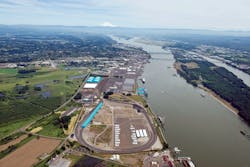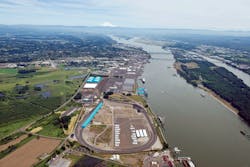The Washington State Energy Facility Site Evaluation Council (EFSEC) on Jan. 5 held the first of three public hearings on its draft environmental impact statement of a proposed Vancouver, Wash., crude oil terminal. The Port of Vancouver USA installation would be able to receive as much as 360,000 b/d of crude by rail for storage and reloading onto tankers bound for refineries in Alaska, California, and Washington.
Crude shipments already move by rail on both sides of the Columbia River Gorge above Vancouver and Portland, Ore., which is directly across the river. But the project's size and capacity already have attracted public attention. "It would be a little less than half of what TransCanada Corp. planned to ship through the Keystone XL pipeline," said Daniel Serres, conservation director for Columbia Riverkeeper of Hood River, Ore., which opposes the project.
EFSEC issued its draft EIS on Nov. 24, 2015, and will accept comments on it until Jan. 22.
The Washington state agency, which was formed in 1970 to provide one-stop permitting and siting reviews for major energy projects, received the project's application from Tesoro Savage Petroleum Terminal LLC on Aug. 29, 2013. Tesoro Savage is a joint venture of Tesoro Refining & Marketing Co. LLC, a subsidiary of San Antonio-based independent refiner-marketer Tesoro Corp., and Savage Cos., a privately-held Midvale, Utah, transportation logistics and facilities management firm.
"There is a lot of interest in this," EFSEC Manager Stephen Posner told OGJ. "Many comments were received during the earlier scoping process for the draft EIS." Posner said the council will then prepare responses to the comments it is receiving before beginning a formal adjudication and additional 60-day comment period to help it make a recommendation to Gov. Jay Inslee (D), who will make the final decision.
'Thorough, fact-based'
"EFSEC is designed to be a thorough, fact-based analysis which makes recommendations to the governor, who has 60 days to approve, deny, or ask for more information about the project," said Jared Larrabee, general manager for the project known as Vancouver Energy. "It has a provision which gives it jurisdiction over any oil facility handling more than 50,000 b/d. EFSEC is made up of representatives of all the major state agencies, the county, the city, and the port. We think the state is the appropriate level for doing this."
Tesoro and Savage already have crude and product transportation experience, he told OGJ. "Tesoro has a crude unloading facility at its Ancortes, Wash., plant, which Savage operates," Larrabee said. "It also operates several more at Washington refineries, and a terminal in North Dakota that can handle 1-2 trains/day. Savage also has operations at East Coast refineries."
The companies proposed the project as a way to transport mainly light, sweet crude from the Bakken formation in North Dakota and eastern Montana to West Coast refineries, which have increased imports as production from Alaska's North Slope has declined. Vancouver Energy would load the crude onto US-flagged marine vessels with US crews for shipment to those refineries.
"Although this would be the first crude oil coming into the port, petroleum products have been moving through here," said Abbi Russell, the Port of Vancouver USA's communications officer. "Tesoro has been a tenant since the 1990s. They and other tenants have handled jet fuel, diesel fuel, and other oil products."
The port is always looking for new projects, and the recent deepening of the Columbia River's channel to 43 ft up to the port's berths means more grain, minerals, and steel as well as crude and products will be able to move in and out in larger vessels with deeper drafts, she told OGJ.
Russell said, "Vancouver is not the only community dealing with the increased movement of crude oil by rail. We have been dealing with our state and federal legislators to make sure that it is handled safely."
The best rail cars
Larrabee said the project, while large, is relatively simple because it does not include a refinery. Tesoro also made a commitment to purchase and use the most advanced rail tank cars, he noted. "Before the new federal standards—almost a year before—we decided we'd accept only CPC-1232 cars into this facility," he said. "Tesoro did the same thing with its Anacortes refinery, and just earlier this year announced it was buying 210 320-J cars."
Another nearly $1 million will be spent on emergency response equipment up and down the river, Larrabee said. "We want to make sure the right rail car is used, and work with the railroad to make sure operations are safe throughout the route," he said. "We have just as much interest as anyone in making sure operations are safe."
The project's sponsors say it will generate $2 billion in economic value to the local and regional economy of Vancouver, Clark County, and surrounding counties through labor income and tax revenues, as well as income and profits created as a result of the oil terminal's direct, indirect, and induced impacts. Clark and surrounding counties will benefit from some 320 full-time jobs during the terminal's construction and 176 direct on-site jobs and 400 direct off-site jobs to operate the facility.
About $1.6 billion of labor income would be produced during construction and assumed first 15 years of operation, Vancouver Energy said. More than $22 million in state and local taxes will be paid during construction, with more than $7.8 million/year in tax revenue to state and local governments for public facilities and services, it indicated.
Serres and other opponents remain concerned. "Oil-by-rail has not been seen to this extent on the Columbia River," he told OGJ. "This decision not only would affect Washington, but the river's entire estuary. Several cities upstream and downstream have raised first response questions, and the river downstream is a major salmon habitat which would be harmed if crude oil was spilled."
Larrabee said, "The length of time this has taken hasn't changed our commitment to the project, or its fundamental need. We need to get crude oil to West Coast refineries. There is definitely demand there for pipeline quality North American crude."
About the Author

Nick Snow
NICK SNOW covered oil and gas in Washington for more than 30 years. He worked in several capacities for The Oil Daily and was founding editor of Petroleum Finance Week before joining OGJ as its Washington correspondent in September 2005 and becoming its full-time Washington editor in October 2007. He retired from OGJ in January 2020.

